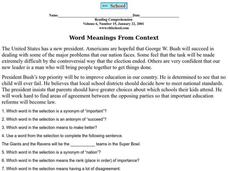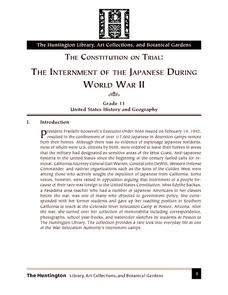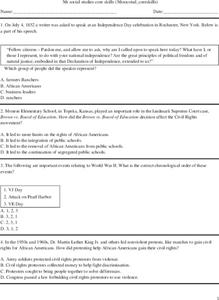Curated OER
The Nonlegislative Powers
Eleventh graders examine the powers of Congress. In this American Government lesson, 11th graders read about Congress. Students complete a worksheet on their findings.
Curated OER
Election of 1860
Young scholars determine how the presidential election of 1860 led to the American Civil War. In this election of 1860 lesson, students discover details regarding the election and hold their own mock debate and election. Young scholars...
Curated OER
Sacagawea And the Lemhi Shoshoni: Contribution To the Lewis And Clark Expedition
Students dentify the period of the Lewis and Clark Expedition and the life of Sacagawea on a timeline that demonstrates the chronology of important events in American History.
Curated OER
Word Meanings From Context
In this reading comprehension worksheet, students read a passage on the United States "new president", George W. Bush. They then answer 7 questions on what they read. This information is not current.
Curated OER
The Constitution on Trial: The Internment of the Japanese During World War II
Eleventh graders analyze primary source documents during the Second World War. Students recall statements of Japanese-Americans who were placed into internment camps during the war.
Curated OER
Freedmen & Jim Crow
In this United States history activity, students utilize a word bank of 10 terms or phrases to answer 10 fill in the blank questions about the African American experience following the Civil War. A short answer question is included as...
Curated OER
Jerry Rubin, Abbie Hoffman, and the 60s Counterculture
Students identify how American society responded to the 1960's counterculture. In this 1960's America lesson, students investigate multimedia sources in order to examine the movement and its impact on the country.
Curated OER
Japanese Internment Camps in the US During World War II
Eighth graders analyze the impact of the Japanese/American conflict during World War II on the Japanese American population and evaluate the consequences of government action regarding international conflict. Students demonstrate their...
Curated OER
A House Dividing: The Growing Crisis of Sectionalism in Antebellum America
Students trace the development of sectionalism in the United States. They explore slavery, freedom and the Constitution. Students identify influential opponents and defenders of American slavery. They explain different solutions to...
Curated OER
Benjamin Franklin
In this early American history worksheet, learners respond to 9 essay and short answer questions about the life and accomplishments of Benjamin Franklin.
Curated OER
The Battle of Honey Springs: The Civil War Comes to the Indian Territory (68)
Learn how the Civil War created fierce conflicts among American Indian nations who had been moved across the Mississippi River.
Curated OER
The South Wins Gettysburg!
Students explore American Civil War, hypothesize that the Union Army was defeated at Gettysburg by Lee's army, and write an essay describing how different North America would be today if the South had won the Civil War.
Curated OER
Adventures of Lewis and Clark Lewis and Clark Journal
Eighth graders experience the Lewis and Clark expedition. In this Corps of Discovery lesson, 8th graders research details regarding the expedition in order to complete a classroom project that requires them to create journals that might...
Curated OER
The Great Depression (1920–1940)
In this online interactive history learning exercise, students respond to 50 multiple choice questions about the Great Depression. Students may submit their answers to be scored.
Curated OER
Korematsu v. United States (1944)
Students examine equal protection. In this Supreme Court lesson plan, students examine primary documents from Korematsu v. United States and discuss the implications of the decision with regards to Japanese internment.
National Endowment for the Humanities
Lesson 2: The Debate in Congress on the Sedition Act
Pupils research and discuss the provisions in the Constitution that supported the arguments for and against the Sedition Act. They articulate objections to and arguments in favor of the Sedition Act.
Curated OER
Thomas Jefferson on the Sedition Act
Young scholars research and cite arguments Jefferson used in objecting to the Sedition Act. They discuss Jefferson's opinion on how constitutional questions about the Sedition Act could be resolved.
Curated OER
Hoover Responds to Unemployment
Learners examine the responses of Herbert Hoover to the challenges of the Great Depression. In this Great Depression lesson, students discuss how Hoover tried to improve the unemployment in the U.S. at the onset of the depression and...
Curated OER
Worksheet Quiz #60 - Impressment and Embargo
In this impressment and embargo historical term quiz, students define the meaning of several terms so that they may further their own historical knowledge on the aforementioned topic.
Curated OER
George Washington on the Sedition Act
Students investigate the Sedition Act and George Washington's position on the act. In this United States Colonial history lesson, students read about George Washington's position on the Sedition Act. Students then participate in a...
Curated OER
The Cherokee Removal
Eleventh graders examine the issue of Cherokee removal from the perspectives of Andrew Jackson, members of Congress, and members of the Cherokee nation. They adopt the perspectives and engage in debate over the issue of Cherokee removal.
Curated OER
The future of Affirmative Action
Eleventh graders explore the term Affirmative Action. In this US History instructional activity, 11th graders create a presentation that will determine the future of federal affirmative action programs. Students write a speech that...
Curated OER
The Atomic Bomb Dilemma
Students examine consequences of using atomic bomb in light of resulting peace, distinguish between fact and opinion and analyze sources to recognize bias and points of view, and assume role of reporter, critic, cabinet member, or...
Curated OER
5th Grade Social Studies
For this social studies worksheet, 5th graders answer multiple choice questions about important court cases, World War II, Abraham Lincoln, and more. Students complete 14 questions.

























